Why is my bearded dragon not eating? It’s a question that worries many reptile owners—especially when their pet suddenly loses interest in food without warning. Bearded dragons are typically enthusiastic eaters, so when they stop eating, it can feel alarming. Whether you’re a first-time beardie parent or an experienced keeper, understanding the reasons behind this behavior is essential for your dragon’s health.
There’s no single answer to “why is my bearded dragon not eating”, as appetite loss can be caused by anything from improper lighting and environmental stress to seasonal changes like brumation or even underlying health issues. In this article, we’ll break down the top five reasons your bearded dragon might be refusing food and guide you through simple, actionable steps to help them regain their appetite.
Why Is My Bearded Dragon Not Eating? A Look at the Basics
Before jumping to conclusions, it’s important to understand the basics behind a bearded dragon’s feeding behavior. In this section, we’ll explore what’s considered normal, how age affects appetite, and when a lack of eating becomes a concern.
What Is Considered Normal Feeding Behavior in Bearded Dragons?
Understanding what’s normal for a bearded dragon’s appetite is the first step in identifying any issues. Typically, a baby bearded dragon eats multiple times a day, with a diet mostly made up of live insects. Juveniles still eat daily, but may gradually shift toward more vegetables. Adult bearded dragons often eat once a day or every other day, with a diet that should be about 70–80% greens and 20–30% insects. It’s normal for appetite to decrease slightly as they mature. Occasional skipped meals—especially for adults—are not uncommon. However, if your dragon consistently refuses food for multiple days without other changes, it may indicate a problem. Appetite can also fluctuate with environmental changes, shedding, or stress, but consistent refusal should never be ignored.
How Appetite Changes as Bearded Dragons Grow
Bearded dragons go through different dietary needs and appetite patterns at each life stage. Babies grow rapidly and have high energy demands. They often seem constantly hungry and need frequent feedings packed with protein. Juveniles begin to show more interest in vegetables but still require daily feedings of insects. Adults slow down significantly. Their metabolism decreases, and they may eat less often—sometimes even skipping a day or two. This is usually normal unless accompanied by weight loss, lethargy, or other symptoms. Understanding these natural shifts helps owners avoid overfeeding or unnecessary worry when appetite decreases with age. However, a sudden change at any stage—especially with no clear cause—should prompt closer observation.
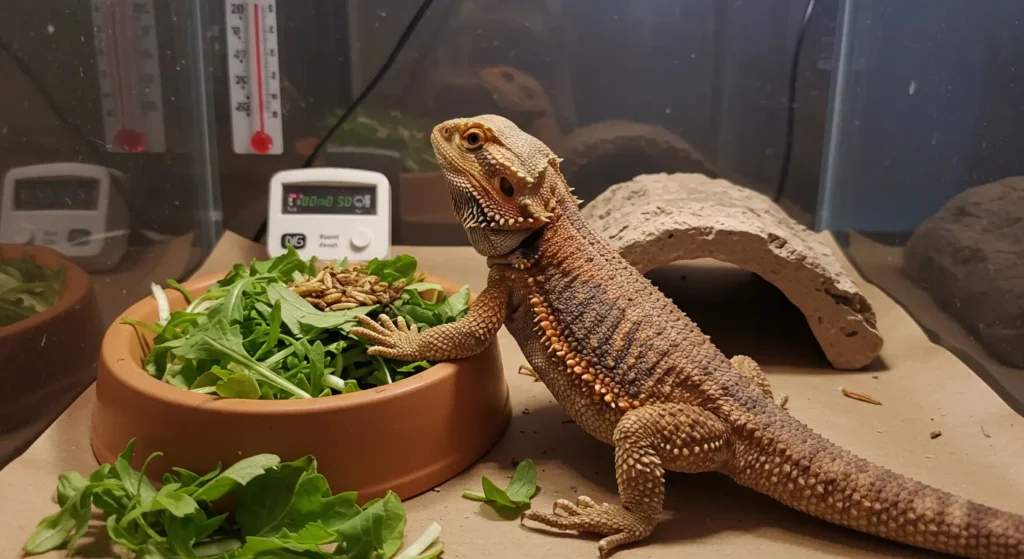
When to Worry If Your Bearded Dragon Stops Eating
It’s not unusual for a bearded dragon to skip a meal or two. However, if your pet refuses food for more than three days—especially if it’s a juvenile or baby—it’s time to take notice. For adults, slight fasting may happen during brumation or shedding. But if your dragon hasn’t eaten in five to seven days and shows signs like lethargy, sunken eyes, or weight loss, something more serious may be going on. These symptoms could point to stress, illness, or improper tank conditions. The key is to monitor both appetite and overall behavior. If appetite loss is paired with reduced activity or changes in stool, don’t delay seeking help from a reptile vet.
The Importance of Routine in Bearded Dragon Feeding Habits
Bearded dragons are creatures of habit, and they thrive on consistent care. Sudden changes in their environment—like moving their enclosure, switching lights, or altering their feeding schedule—can cause stress that affects their appetite. A stable routine helps them feel secure and supports healthy digestion. Feeding them at the same time each day, maintaining optimal lighting and temperature, and minimizing disruptions in their surroundings all play a role in appetite regulation. Even something as simple as changing the type of feeder insect can throw them off temporarily. Consistency reduces anxiety, builds trust, and encourages regular eating habits—especially in younger dragons adjusting to captivity.
Habitat Problems That Explain Why Your Bearded Dragon Is Not Eating
Sometimes the reason your bearded dragon isn’t eating has less to do with health and more to do with its environment. Even small issues in lighting, temperature, or tank setup can disrupt appetite. Let’s explore the most common habitat-related problems that may be affecting your dragon’s feeding behavior.
If you’re unsure whether your tank setup is correct, check out our complete 120-gallon bearded dragon tank setup guide to optimize lighting, basking spots, and environment layout.
Incorrect Basking or Cool Side Temperatures
Bearded dragons rely on external heat to regulate their digestion. If the basking area is too cool, their body can’t reach the temperature needed to break down food properly. This often leads to sluggishness and a loss of appetite. On the other hand, if the cool side of the enclosure is too warm, your dragon can become stressed and overheated. A proper temperature gradient is essential. The basking spot should be between 95–110°F, depending on the age of the dragon, while the cool side should remain around 75–85°F. This gradient allows the dragon to move between zones and self-regulate its body temperature. Without this control, digestion slows, and feeding behavior may change. Always use reliable thermometers on both sides of the tank to ensure accuracy.
UVB Lighting Problems and How They Impact Your Bearded Dragon’s Digestion
UVB lighting is vital for a bearded dragon’s metabolism, especially for calcium absorption and vitamin D3 synthesis. Without proper UVB exposure, your dragon may experience metabolic issues like metabolic bone disease (MBD), fatigue, or weakened immunity. These health issues often begin subtly—one of the earliest signs is appetite loss. If the bulb is too old, too weak, or improperly placed, your dragon won’t get the UVB it needs. UVB bulbs should be replaced every 6–12 months, even if they still emit visible light, as their UVB output diminishes over time. Ensure there is no glass or plastic between the bulb and your dragon, as this blocks the UVB rays. Consistent exposure to high-quality UVB lighting directly supports digestion, appetite, and overall well-being.
Dirty Tanks and Unsanitary Conditions
A clean environment is more than just visually pleasing—it’s essential to your bearded dragon’s health and eating habits. A dirty enclosure can harbor bacteria, parasites, and mold, all of which may lead to illness or appetite suppression. The smell, buildup of feces, and decaying food can stress your dragon and deter it from eating. In some cases, poor hygiene may cause respiratory or digestive infections, making it painful or uncomfortable to eat. Regular spot cleaning should be done daily, with a deeper clean weekly or bi-weekly. All uneaten food should be removed within a few hours. Substrate, decor, and feeding dishes should also be disinfected regularly. A clean tank promotes a calm, safe environment where your bearded dragon can eat comfortably and thrive.
Environmental Stress That May Cause Your Bearded Dragon to Stop Eating
Bearded dragons are sensitive to environmental changes, and stress is a major factor that can suppress appetite. Loud noises, frequent handling, new tank mates, or even a new location for the enclosure can disrupt their routine and cause feeding refusal. Reflections in the glass, bright lights outside the tank, or pets nearby can also make your dragon feel unsafe. A stressed dragon may hide more often, turn darker in color, or act defensively. Maintaining a quiet, low-traffic area for your dragon’s enclosure helps minimize these stressors. Covering the back and sides of the tank with background paper or placing it in a corner can help reduce external distractions. A calm and predictable environment builds trust—and a relaxed bearded dragon is far more likely to eat normally.
Brumation, Stress, or Illness: Why Bearded Dragons Stop Eating
Not all appetite loss in bearded dragons is caused by habitat issues—sometimes the problem runs deeper. Brumation, emotional stress, or underlying illness can all lead to feeding problems that require closer observation. In this section, we’ll explore how to tell the difference and what signs to watch for.
How to Identify Brumation Signs
Brumation is a natural state of dormancy, similar to hibernation, that many bearded dragons enter during cooler seasons. A brumating dragon will often become less active, sleep for long periods, and eat little or nothing at all. You may notice them spending more time in hiding, digging into the substrate, or staying in the cool side of the enclosure. Their eyes may remain closed even while resting outside of their hide. Appetite loss during brumation is normal and shouldn’t cause concern unless other symptoms appear. Brumation usually occurs in late fall or winter and can last a few weeks to several months. If your enclosure has consistent heating and lighting year-round, brumation may be delayed or skipped altogether. Understanding these signs helps prevent unnecessary panic when your dragon naturally slows down.
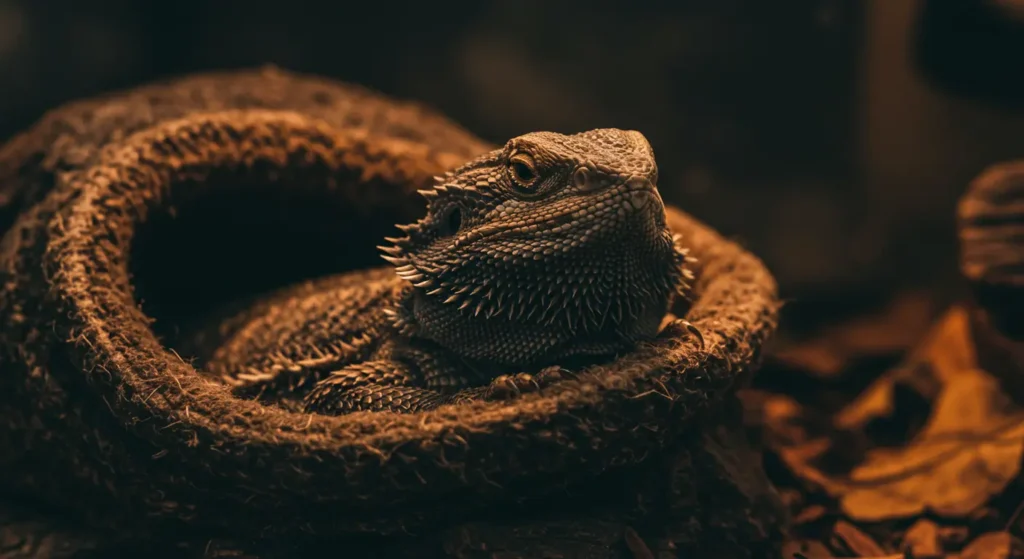
Stress-Induced Appetite Loss
Stress is a common cause of appetite loss in bearded dragons, especially when they are exposed to sudden or repeated changes. Moving to a new home, frequent handling, or rearranging their enclosure can make them feel unsafe. Even placing the tank in a high-traffic or noisy area can cause stress. Overcrowding—such as housing multiple dragons in one enclosure—can also lead to anxiety and food refusal. A stressed dragon might avoid basking, hide more often, or darken in color. They may also become less responsive to food or exhibit defensive behaviors. To minimize stress, provide a stable environment, reduce noise, and avoid unnecessary handling during adjustment periods. Giving your dragon time and space to feel secure can naturally restore their appetite.
Common Health Problems That Stop Bearded Dragons From Eating
Several health issues can make your bearded dragon stop eating. One common cause is parasites, which can disrupt digestion and lead to diarrhea or lethargy. Respiratory infections often result from poor humidity or low temperatures and may cause wheezing, mouth breathing, or mucus buildup. Another serious issue is gut impaction, where indigestible material blocks the digestive tract. This may happen from eating oversized insects, loose substrate, or foreign objects. Dragons with impaction often stop eating, become bloated, and show difficulty walking or moving their back legs. Illness-related appetite loss typically comes with other symptoms, such as rapid weight loss, weakness, or odd stool. If your dragon shows any combination of these signs, it’s essential to take action quickly.
When Should You Take a Bearded Dragon to the Vet for Not Eating?
If your bearded dragon hasn’t eaten for several days and shows additional symptoms like lethargy, black beard, sunken eyes, or weight loss, it’s time to contact a reptile veterinarian. Professional help is crucial when you suspect illness, impaction, or serious stress. A reptile vet will perform a physical exam, possibly take a fecal sample, and may order X-rays or bloodwork depending on the situation. Early diagnosis is key to preventing more serious health complications. Avoid attempting home treatments unless directed by a vet, as incorrect care can make things worse. Trust your instincts—if something feels off, it’s better to be cautious. Timely veterinary support can make a significant difference in your dragon’s recovery and long-term health.
Feeding Mistakes That Might Be to Blame
Even with the best intentions, many owners make simple feeding mistakes that can lead to appetite loss. From poor food choices to overfeeding, these errors can disrupt your bearded dragon’s health and interest in eating. Let’s explore the most common feeding mistakes and how to fix them.
Offering the Wrong Foods or Poor Variety
Bearded dragons thrive on a varied and balanced diet. Feeding them the same insect or vegetable every day can lead to boredom and nutritional gaps. Over-relying on sugary fruits or soft vegetables like lettuce can also cause problems. Fruits should only make up a small part of the diet, especially for adult dragons. Feeding too much fruit can lead to diarrhea or poor calcium absorption. Insect variety is equally important. If your dragon only eats one type of feeder insect—such as crickets—they may stop eating due to lack of interest or essential nutrients. Rotate insects like dubia roaches, silkworms, and hornworms, and mix in nutrient-rich greens such as collard, mustard, or dandelion greens. A well-rounded diet not only boosts appetite but also helps prevent long-term health issues.
Insects That Are Too Large or Improperly Prepared
Feeding insects that are too large can lead to choking, digestive issues, or even gut impaction. A good rule of thumb is to never offer a feeder insect longer than the space between your dragon’s eyes. Many owners overlook this simple size guide and unintentionally cause feeding problems. Additionally, live feeders must be gut-loaded (fed nutritious foods) and dust-coated with calcium and vitamin D3 supplements before being offered. Without proper preparation, the insects provide little nutritional value and may even lead to deficiencies over time. Improper feeder care is one of the most common reasons behind poor appetite and long-term health decline in pet reptiles. Preparing food correctly ensures your dragon receives the nutrients it needs to stay healthy and interested in eating.
Overfeeding or Underfeeding Schedule
Both overfeeding and underfeeding can cause your bearded dragon to stop eating. Overfeeding—especially with fatty insects or frequent treats—can make them feel full for long periods, leading to sluggish digestion and a reduced appetite. Underfeeding, on the other hand, can result in nutrient deficiencies and fatigue. The feeding schedule should be age-appropriate. Babies need to eat 2–3 times a day, juveniles once or twice, and adults usually once every day or every other day. Sticking to a consistent feeding routine helps maintain their internal rhythm and encourages regular eating. Sudden changes in feeding times or skipping meals too often can stress your dragon and disrupt their appetite. Monitoring both quantity and frequency is key to avoiding these common mistakes.
Bearded Dragon Not Eating Greens or Veggies
It’s common for bearded dragons to prefer insects over greens, especially if they weren’t introduced to vegetables early on. However, a lack of greens in their diet can lead to nutritional imbalances and decreased interest in food overall. To fix picky eating, try offering a wider variety of vegetables and rotating them regularly. Mix in strong-scented herbs like cilantro or basil to stimulate appetite. You can also lightly moisten the greens or add a few worms on top to encourage nibbling. Avoid feeding too many insects before offering greens, as a full dragon is unlikely to try vegetables. Over time, building a habit of morning veggie feedings followed by insects later in the day can help them adjust. Patience and persistence are key to changing picky habits.
If you’re unsure about offering herbs, this cilantro feeding guide for bearded dragons explains how to serve it safely and encourage picky eaters.
Feeding Mistakes That May Be Why Your Bearded Dragon Isn’t Eating
If your bearded dragon is refusing to eat, it’s important to stay calm and take practical steps. In many cases, the issue can be resolved with small adjustments to their care routine. This section covers effective strategies to help your dragon regain its appetite safely and naturally.
Proven Ways to Stimulate Appetite Safely
When your bearded dragon stops eating, there are gentle methods to help spark their appetite. A warm soak can aid digestion and reduce stress, especially if the dragon is mildly dehydrated. Soak your beardie in shallow, lukewarm water for about 15–20 minutes. Hand-feeding can also encourage eating, especially when offering favorite treats like waxworms or soft vegetables. Use feeding tongs or your fingers to offer food directly. Sometimes a new feeder insect—like hornworms or phoenix worms—can trigger interest due to movement or scent. Be sure the feeders are gut-loaded and appropriately sized. Keep feeding sessions calm and positive. If your dragon shows interest, offer food again later the same day. Never force-feed unless directed by a reptile vet. These simple, safe techniques often help your dragon return to normal eating habits.
Adjusting the Environment to Encourage Feeding
Sometimes a few tweaks to your dragon’s habitat can make a big difference in appetite. Ensure the basking temperature is between 95–110°F and the cool side stays around 75–85°F. Poor temperature regulation often leads to digestion problems and food refusal. Check that your UVB bulb is strong, unblocked, and not expired—ineffective lighting can lower energy levels and reduce appetite. The enclosure should be calm, free from loud noises, and away from direct traffic or other pets. If your dragon feels threatened, it may stop eating as a stress response. Adding visual barriers or moving the tank to a quieter space can help. Feeding in the morning, when your dragon is alert and warm, also improves success. A relaxed and well-regulated environment supports both digestion and feeding behavior.
Temporary Fasting vs. Emergency Intervention
It’s important to know the difference between a short-term fast and a serious issue. Adult bearded dragons can sometimes go a few days without food, especially during seasonal changes or minor stress. However, if your dragon hasn’t eaten for more than five to seven days, or shows symptoms like lethargy, weight loss, or sunken eyes, it may be time to seek help. For babies or juveniles, even two days without food could be risky. Monitor their behavior closely. A dragon that is alert, basking, and pooping regularly may just be adjusting. But if they’re hiding, weak, or not passing stool, the situation could be urgent. When in doubt, consult a reptile veterinarian. Acting early can prevent complications and ensure your pet gets the treatment it needs.
Wondering how long your dragon can safely go without eating? Here’s a complete guide on how long bearded dragons can go without food.
Reintroducing Food After Stress or Brumation
After a period of stress or brumation, your bearded dragon may not immediately resume eating. Start by offering hydrating foods like soft greens or small insects with high moisture content, such as hornworms. Keep feeding sessions short and low-pressure. Avoid overwhelming them with large portions or unfamiliar foods. Offer food at the same time each day, preferably mid-morning when they’re most alert. Make sure lighting and heating are fully optimized so their metabolism functions properly. Hand-feeding may help during the transition, especially if they’re hesitant. If your dragon still refuses to eat after several days of brumation recovery, monitor for weight loss or signs of illness. Patience is key—most dragons resume eating gradually as their systems readjust to activity and warmth.
Frequently Asked Questions
How long can a bearded dragon go without eating?
Adult bearded dragons can sometimes go up to two weeks without eating, especially during brumation. However, baby and juvenile dragons should not go more than a few days without food. If your dragon stops eating for more than five days, it’s best to monitor other symptoms and consult a reptile vet.
Why is my bearded dragon not eating but still active?
If your bearded dragon is active but not eating, it could be adjusting to environmental changes, going through a seasonal cycle, or simply full from a previous feeding. Check your lighting, temperature, and feeding routine to rule out minor causes before assuming it’s a health issue.
Is it normal for bearded dragons to stop eating during shedding?
Yes, appetite loss is common during shedding. The process can cause irritation and discomfort, making your dragon less interested in food. Offer softer, easy-to-digest foods and ensure humidity levels are appropriate to help them shed properly.
Could my bearded dragon be sick if it refuses food?
Yes, illness is a possible cause—especially if appetite loss is paired with symptoms like lethargy, bloating, dark coloration, or unusual stool. Conditions like impaction, parasites, and respiratory infections can all affect appetite. A vet visit is recommended if these signs appear.
What should I do if my bearded dragon hasn’t eaten in a week?
Start by checking the enclosure’s temperature and lighting setup. Ensure the UVB bulb is working and the basking area is within the correct range. Try offering a favorite treat or hand-feeding. If there’s no improvement and your dragon shows signs of distress, consult a reptile vet.
Can stress really stop a bearded dragon from eating?
Absolutely. Bearded dragons are sensitive to changes in their environment. Loud noises, frequent handling, tank relocation, or the presence of other pets can all cause stress, which often leads to appetite suppression. Reducing disturbances and creating a calm habitat can help.
How do I get my picky bearded dragon to eat vegetables?
Try offering a variety of greens in rotation, mixing in fragrant herbs like basil or cilantro. You can also place feeder insects on top of the salad to encourage interest. Feeding veggies in the morning before offering insects helps promote better eating habits.
Conclusion
If you’ve been asking yourself, “Why is my bearded dragon not eating?”, you’re not alone—and thankfully, the answer is often fixable. From habitat conditions and stress to feeding mistakes or natural cycles like brumation, there are many reasons a bearded dragon might refuse food. The key is to observe closely, make small adjustments, and stay patient.
By understanding your dragon’s needs and responding to early signs, you can often restore their appetite without panic. But if the problem continues or is paired with other symptoms, don’t hesitate to consult a reptile vet. Your attention and care make all the difference in keeping your bearded dragon happy, healthy, and thriving.

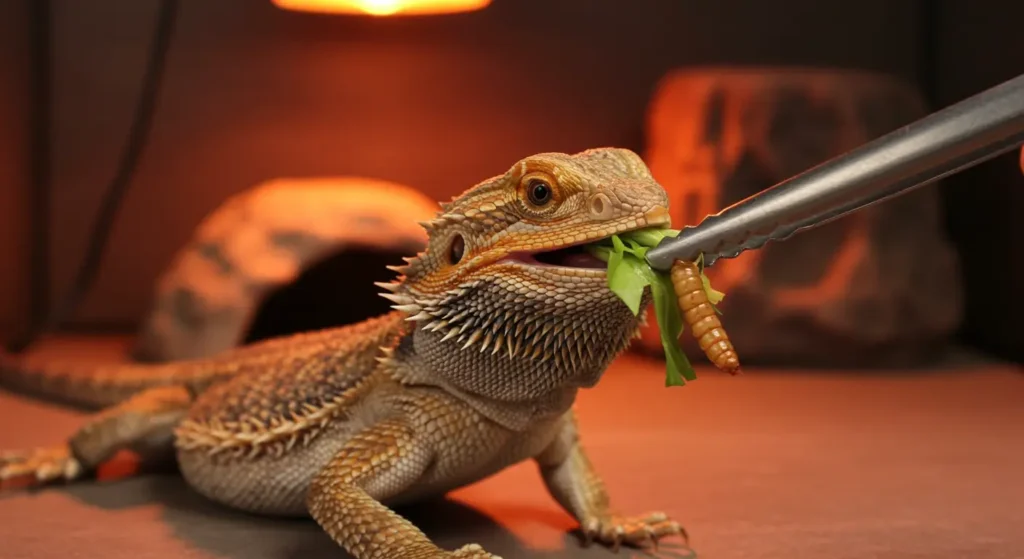
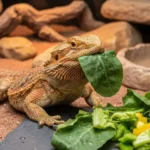
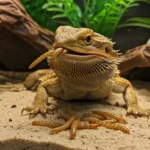
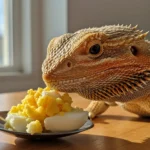
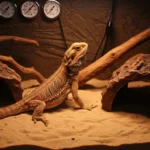
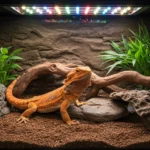
2 thoughts on “Why Is My Bearded Dragon Not Eating? Top 5 Reasons”